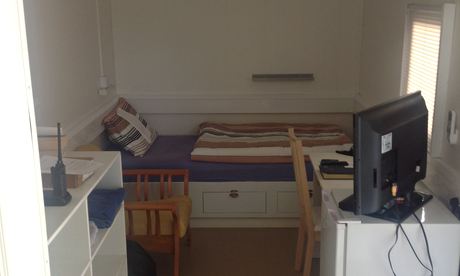FCO's Simon Fraser visits staff in Mogadishu, risking their lives to support a stable and democratic future in Somalia
 |
Staff at Britain's newest embassy in Mogadishu, Somalia live, work and socialise within a small compound surrounded by armed guards.
|
Simon Fraser, Foreign Office permanent secretary
Mogadishu, Somalia – inside a small compound within the heavily guarded barriers of Mogadishu International Airport, in a country which has seen over two decades of civil war, lies Britain's newest embassy.
We are the first EU state member to have reopened our embassy in Mogadishu, evidence of our commitment to working with the federal government of Somalia to rebuild the country. Stability, democracy and prosperity are vital for the future of the Somali people but also for wider international security, including here in the UK. Radicalisation and extremism abroad can so easily find its way onto Britain's streets.
I visited at the end of April with Mark Lowcock, the permanent secretary of the Department for International Development (DFID). Being in Mogadishu gave me a sense of hope; a lot of progress has been made over the past couple of years.
African Union peacekeepers have recovered territory from the Al Shabaab militias. I was even able to visit the port of Kismayo which Al Shabaab controlled until 2012. The economy is starting to revive and the president has promised a new federal political plan for reform by 2016. In Somalia, co-operation between the regions will be the key to success.
 The ambassador's suite: everyone in the compound lives in 8m by 2m reinforced containers.
The ambassador's suite: everyone in the compound lives in 8m by 2m reinforced containers.
Helping the government of Somalia drive forward this agenda is a remarkable team of British civil servants from the Foreign Office, DFiD, the ministry of defence and other departments. Their work is tough and dangerous. They live, work and socialise within the same small compound with few recreational facilities, surrounded by armed guards. Everyone – including the ambassador – lives in 8m by 2m reinforced containers.
Despite the progress being made in Mogadishu, moving around is risky and requires careful planning. Getting out of the airport to do the business of diplomacy, building networks and supporting daily life in the country poses unique challenges: body armour, vigilance and meticulous security arrangements with armed protection officers are all required. There have been several major security incidents in Mogadishu alone in the past month.
In such a tough environment you might expect our staff to become weary, pessimistic or disheartened. Instead I found them enthused and highly motivated, deeply committed and making the best of what they have. They've even created a small garden and a makeshift gym inside the compound.
They team works closely with the highest levels of the Somali government, including president Hassan Sheikh Mohamud. Many of the Somali officials they work with grew up and were educated in the UK. Having left the Somalia at the height of the troubles, they have now returned to help rebuild the country. This is a real cause of hope: it means our staff are able to build close relationships and effective partnerships with people in politics, administration, business and civil society.
In the Foreign and Commonwealth Office, we call this kind of work 'expeditionary diplomacy' – people from different parts of Whitehall taking risks and putting up with hardship, making a difference in other countries, which also reduces dangers in the UK. I came away from Mogadishu with deep admiration for the staff under the leadership of ambassador Neil Wigan. Their dedication and sacrifices exemplify what we want in the modern civil service.
Simon Fraser is permanent secretary at the Foreign and Commonwealth Office.
• Want your say? Email us at public.leaders@theguardian.com
No comments:
Post a Comment